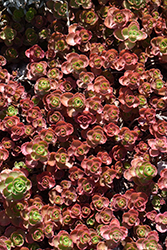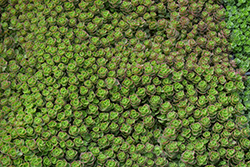Height: 4 inches
Spacing: 14 inches
Sunlight:
![]()
![]()
Hardiness Zone: 2a
Other Names: Two Row Stonecrop
Description:
A vigorous perennial groundcover with small succulent foliage which emerges colorful shades of red, eventually fading to dark green; flowers a sea of deep cherry red in summer, spreads rapidly to form a dense low mat; needs a dry and sunny location
Ornamental Features
Dragon's Blood Stonecrop is smothered in stunning rose star-shaped flowers at the ends of the stems from early to mid summer. Its attractive tiny succulent round leaves emerge burgundy in spring, turning dark green in colour with distinctive dark red edges. As an added bonus, the foliage turns a gorgeous dark red in the fall.
Landscape Attributes
Dragon's Blood Stonecrop is a dense herbaceous perennial with a ground-hugging habit of growth. It brings an extremely fine and delicate texture to the garden composition and should be used to full effect.
This plant will require occasional maintenance and upkeep, and is best cleaned up in early spring before it resumes active growth for the season. Deer don't particularly care for this plant and will usually leave it alone in favor of tastier treats. Gardeners should be aware of the following characteristic(s) that may warrant special consideration;
- Spreading
Dragon's Blood Stonecrop is recommended for the following landscape applications;
- Mass Planting
- Rock/Alpine Gardens
- Border Edging
- General Garden Use
- Groundcover
- Container Planting
Planting & Growing
Dragon's Blood Stonecrop will grow to be only 4 inches tall at maturity, with a spread of 18 inches. When grown in masses or used as a bedding plant, individual plants should be spaced approximately 14 inches apart. Its foliage tends to remain low and dense right to the ground. It grows at a fast rate, and under ideal conditions can be expected to live for approximately 10 years. As an herbaceous perennial, this plant will usually die back to the crown each winter, and will regrow from the base each spring. Be careful not to disturb the crown in late winter when it may not be readily seen!
This plant does best in full sun to partial shade. It prefers dry to average moisture levels with very well-drained soil, and will often die in standing water. It is considered to be drought-tolerant, and thus makes an ideal choice for a low-water garden or xeriscape application. It is not particular as to soil pH, but grows best in poor soils, and is able to handle environmental salt. It is highly tolerant of urban pollution and will even thrive in inner city environments. This species is not originally from North America. It can be propagated by division.
Dragon's Blood Stonecrop is a fine choice for the garden, but it is also a good selection for planting in outdoor pots and containers. Because of its spreading habit of growth, it is ideally suited for use as a 'spiller' in the 'spiller-thriller-filler' container combination; plant it near the edges where it can spill gracefully over the pot. Note that when growing plants in outdoor containers and baskets, they may require more frequent waterings than they would in the yard or garden.
Disclaimer - This resource is provided for informational purposes only and does NOT reflect current availability. Inventory varies seasonally, so we cannot guarantee that every plant will be in stock at all times - please contact your favourite GardenWorks location directly for current availability. It does not include our entire inventory of plants, so be sure to visit GardenWorks to see varieties that may not be represented on this list.


